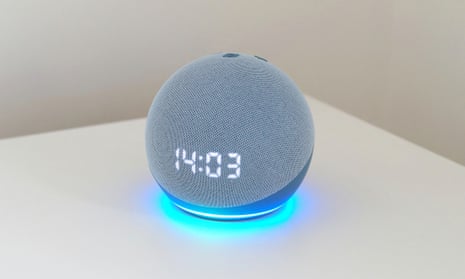Amazon plans to let people turn their dead loved ones’ voices into digital assistants, with the company promising the ability to “make the memories last”.
The company is developing technology that will allow its Alexa digital assistant to mimic the voice of anyone it hears from less than a minute of provided audio, Rohit Prasad, its senior vice-president and head scientist, said on Wednesday. He added that during the coronavirus paramedic “so many of us have lost someone we love”.
While no timescale was given for the launch of the feature, the underlying technology has existed for several years. The company gave a demonstration where the reanimated voice of an older woman was used to read her grandson a bedtime story, after he asked Alexa: “Can grandma finish reading me the Wizard of Oz?”
Prasad said: “The way we made it happen is by framing the problem as a voice conversion task and not a speech generation path.”
Beyond the initial demonstration, details were scarce. The technology was announced at the company’s re:Mars conference, focusing on its “ambient computing” achievements in the realms of machine learning, automation, robots and space.
Amazon’s aim for its voice assistant is “generalisable intelligence”, Prasad added, contrasting it with “all-knowing, all-capable, uber-artificial general intelligence” of science fiction.
But other technology companies have been cautious about making digital voice-doubles so easy to produce: hours before Amazon announced its plans, Microsoft published new artificial intelligence (AI) ethics rules that would put strict limits on who could create synthetic voices and how they could be used. “It is … easy to imagine how it could be used to inappropriately impersonate speakers and deceive listeners,” said Natasha Crampton, the company’s chief responsible AI officer.
Microsoft will require companies to apply for permission to make artificial voices, and last month began watermarking them with an inaudible signal that would allow it to identify misuse.
The concept of using AI to revive the dead – or appear to – is not a new one, even outside the realm of science fiction. In 2020, Joshua Barbeau trained a version of the GPT-3 chatbot on conversation logs with his late fiancee Jessica, who had died eight years earlier. And in 2018, Eugenia Kuyda built a chatbot out of the old text messages of her friend Roman Mazurenko. “I didn’t expect it to be as impactful. Usually I find showing emotions and thinking about grief really hard so I was mostly trying to avoid it. Talking to Roman’s avatar was facing those demons,” she said at the time.
This article was amended on 14 July 2022. Roman Mazurenko was Eugenia Kuyda’s friend, not her partner as an earlier version said.








